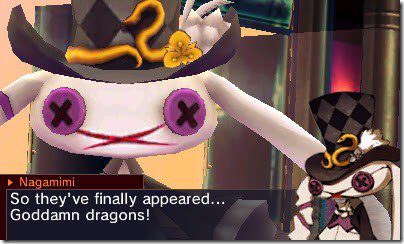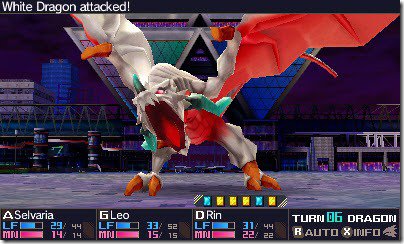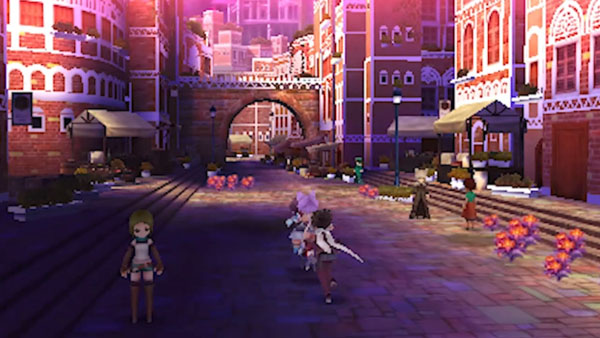Unique classes and customizable parties allow for tactical and rewarding battles; lengthy quest with a nicely balanced difficulty; distinct audio and visual design give the game an identity all its own; Nagamimi, the lovable jerk of a mascot.
Story rarely rises above mediocrity and is hurt by lack of a central protagonist; complete lack of 3D effects throughout the game; some inconsistencies or shortcomings in the visual designs and music; easy mode is a little too easy.
There’s a very good chance that few among you would be all that familiar with the 7th Dragon franchise; I certainly wasn’t. The series dates back to 2009 when the first entry premiered on DS, joining the handheld’s roster of well-received JRPGs. However, neither it nor its PSP followups made it outside of Japan, thus my, and likely your, lack of awareness. The impressively titled 7th Dragon III Code: VFD breaks this mold by coming to North America, and just in time for its developer Imageepoch to fold. This might be the only 7th Dragon title to reach our shores, which is sad, because it’s a pretty good game.
7th Dragon III takes place in a near future version of our world, several decades after humanity fought off a dragon invasion, but all signs point to an impending second offensive. You create and take control of a party of characters who partake in a popular video game simulating the historic invasion; it turns out the game is a secret test designed by its developer, Nodens Enterprises, to locate people with the skills needed to fight back the dragons, and your characters are naturals. The top brass at Nodens are gearing up for the eventual arrival of VFD, the 7th True Dragon and the most powerful of all the beasts, and the only way to defeat him is to hunt down the other True Dragons, defeat them, and use their essence to gain the know-how to fight back against VFD. Things are made more interesting by the fact that the other true dragons are located in past and future time periods, so time travel to exotic places happens to be in the cards as well.
All things considered, the story is serviceable but isn’t the game’s best feature. The general thrust of events is engaging and serves to move things along fairly well, and there are some legitimately great moments, but mostly it is just good. The thing that really holds the plot back are really the characters. Much of the named cast are quite rote and instantly recognizable to anyone who has ever played a JRPG or watched an anime, while others are just quirky for the sake of being quirky, ultimately coming across as strange rather than humorous or interesting. Allie and Julietta, two Nodens executives, are especially guilty of this. On the plus side, a few characters do manage to stand out, such as the super soldier with a complex about proving himself to be the ultimate dragon-killing machine, and the now ubiquitous cute mascot character who plays against type by being a foul-mouthed fatalist who generally hates people and is sure that your party will probably fail and die a horrible death in the process.

The biggest character issue actual comes down to your party. Every character you control is created by you from a selection of classes, character art, and color palettes and they are all effectively silent when it comes to the story. You are occasionally given dialogue choices, but it only leads to minor variations in the script. What’s weird, though, is that you are free to change out party members, but whoever is in the lead spot is treated like they have been the main character of the story the whole time. You could create a brand new character and everyone will be talking about great he or she is, including a character who serves as a quasi-love interest. It’s almost like the developers were trying to create a party system more in line with pure dungeon crawlers like the Etrian Odyssey games, while also trying to make a story-centric RPG. Unfortunately, these efforts muddle the story, but they make the gameplay, especially the turn-based battles, great.
At its core, 7th Dragon III is a game about party composition thanks to the efforts the developers went to in creating interesting classes with unique purposes that intertwine with each other in fascinating ways. Despite some strange class names like Agent, Duelist, and Banisher, most classes fall into fairly typical offensive, defensive, and support roles, but the way in which they can interact with one another offers strategic depths few RPGs can match. For example, my Agent has an ability that causes additional fire damage whenever fire damage is dealt to the enemy, and my Samurai, a fairly straightforward offensive class, has an attack that deals fire damage and makes his/her normal attacks fire-based too. And then my Duelist, a magic user whose spells are based off randomly drawn elemental cards, has a spell that does fire damage at the end of each turn based on the number of fire cards used. So, in other words, by building an offense around these sorts of skills you can drastically increase your damage output. Furthermore, the number and effects of buff and debuff skills among the classes opens even more doors for various skills and will help increase the effectiveness of others used by other party members. In short, there are a whole lot of options.
The act of dungeon diving is also made exceptionally fun thanks to solid design and some unique ideas. In addition to the semi-random battles, an indicator effectively counts down the time between battles, and there are dragons roaming the halls that act almost like mini-bosses. You can attempt to attack them from the rear to for a preemptive attack, but they can do the same to you as well. Furthermore, if you take too long to finish a random fight while close to a dragon, there’s a possibility the dragon will jump in on the action. All of this adds a nice layer of strategy to exploration, as does another one of my favorite features. Eventually you actually get the ability to manage three separate parties, and though only one can be active in exploration and battles at any given time, you can swap between them to keep yourself fresh during long journeys into the dragon-filled depths. Of course, outfitting each party is an expensive proposition, so some grinding for money is required, but experience and skill points are shared among all parties so that helps streamline things a bit as well.

A fair bit of the press surrounding 7th Dragon III seems to be suggesting it is exceptionally difficult, though I think that may have more to do with the current trend among dungeon crawlers, because I found the game to be fairly well balanced. While it might be more difficult than your average Final Fantasy game, 7th Dragon III quickly rewards you for taking advantage of its deep class system; it doesn’t simply hand victories to you, but it allows enough leeway to give you the opportunity to learn and experiment. Also, in the event you run into a wall, you can turn on easy mode, though I wouldn’t recommend keeping it on too long, because the normal level of challenge generally does hit the sweet-spot in terms of being tough yet fair and rewarding. Of course, after putting several dozen hours into the game, you’ll eventually reach the late game content that does up the challenge quite a bit for those looking to really test themselves.
7th Dragon III generally has a nice, unique look to it, though I do have a few issue. Most of the character designs are quite nice and detailed, though it does strike a bit of a pet peeve of mine in that more than a few are over designed and look more like they should be taking part in an avant garde fashion show than slaying dragons. The world itself usually looks good as well and quite strongly features purple, blue, and orange hues in a way that gives the game a distinct look, though sometimes it does result in a bit of color monotony. Also, there are some wonderfully imaginative environments that probably would have looked great in 3D, but not a single second of the game supports 3D. Also, a little more variety in the look and feel of locations would have been appreciated.

The music in 7th Dragon III actually parallels the visuals in many ways; it’s frequently unique and well done, but at times suffers from overwrought ideas and repetition. The tracks generally have a solid, distinctly modern foundation, but mix in a variety of styles and instrumentation to create a sound that is often exotic. This makes the more standard tunes come off as somewhat jarring, and the problem is that most of those tunes show up in your home base that you frequently visit. Everything sounds better when you’re in far flung times or exploring a dungeon.
7th Dragon III is another solid JRPG for 3DS gamers. Though it lacks the well-rounded ideas and craftsmanship of the genre’s absolute best, it manages to have a distinct identity and solid enough mechanics that make it easy enough to recommend. Of course, that recommendation is made a little more wary if your primary interest is plot and characters, because the story really has only a few moments that really shine and the focus on player-built parties limits the opportunity for great character moments and even disrupts proceedings to an extent. Mechanically, however, 7th Dragon III is a rather impressive piece of game design. The various classes each have a unique sense of purpose while also playing well off each other to create a plethora of strategic opportunities. Plus, some well conceived tweaks and additions to your standard dungeon crawling fare along with a well balanced difficulty curve just make the actual act of playing the game that much better. So, if your love for RPGs comes from a love for strategic thinking and party customization, then 7th Dragon III absolutely deserves a look.
Nintendojo was provided a copy of this game for review by a third party, though that does not affect our recommendation. For every review, Nintendojo uses a standard criteria.




 ShareThis
ShareThis





